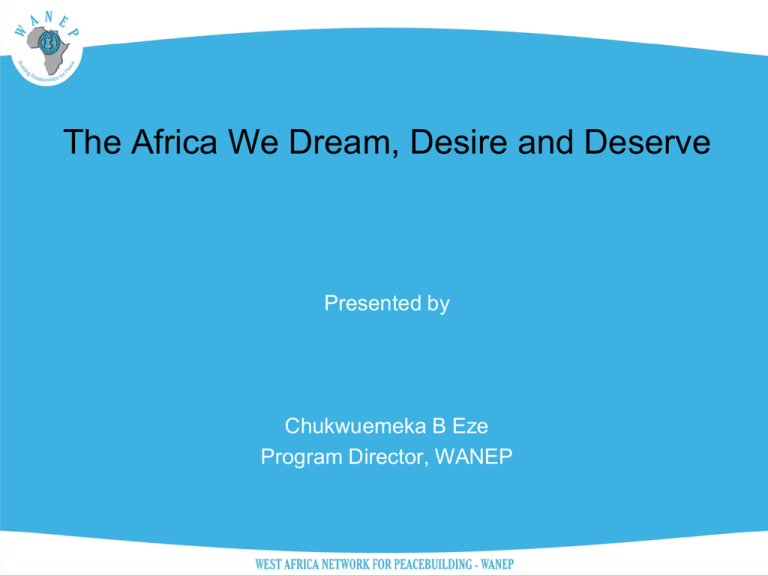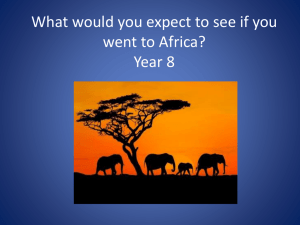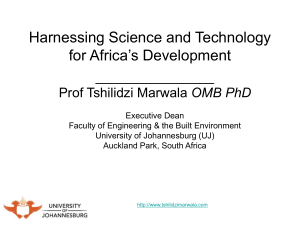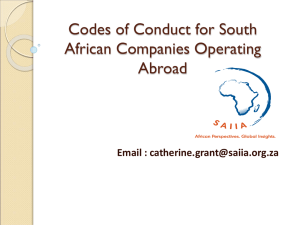THE AFRICA WE DREAM, DESIRE AND DESERVE
advertisement

The Africa We Dream, Desire and Deserve Presented by Chukwuemeka B Eze Program Director, WANEP Introduction • Finding African Solutions to African Problems has become a mantra and no longer a new ideology in discourse of this nature. Notable leaders like Kwame Nkrumah in his book, I speak of Freedom, (1909-1972) observed that “Africans must find an African solution to African problems, and that this can only be found in African unity. • The myriad of African challenges of our time include but not limited to general lack of development, gross human rights violations, inability to organize free and fair elections, perennial armed conflicts and insurgencies, political instability, unrelenting economic crises, financial corruption, wasteful spending, famine, diseases and poverty, all of which have become trademarks of the African continent. • We are very happy and appreciative of the AUC’s opportunity and space not just to discuss these challenges but articulate our dream Africa which we surely desire and deserve The Fallacy of Integration and Economic Development The theory of “African Union” has remained more on papers and public discourse than in reality. The transformation from Organization of African Union to African Union has become more of name and regime change than the intentions and purposes it was meant to achieve We desire and deserve an Africa that is truly united in voice, in actions and in structures The Fallacy of Integration and Economic Development • Africans desire and deserve true integration that is evident in the forms of movement of goods and people in the continent, in the form of visa acquisition, treatments at the point of entry of member states and in the working and living standards of African Citizens in Africa • The resourcing and financial independence of AUC to better coordinate the RECs, provide leadership in peace, security and governance architectures of the continent is long over due and need to move beyond formation of committees and reports of the committees only to set up another committee to review the report of the committee. Africa citizens want to see a Truly United Africa and Africa Union • Participation • Exclusion hits at the nerve centre of people’s identity because it bases itself on discrimination. Exclusion happens because of imbalances of power and safeguarding one group ’ s control over processes and resources that are seen as essential for survival Our desire is to participate in the affairs of our continent. We want a true government of the people, by the people and for the people. This is the minimum democracy provides and Africans desire it. We want an AU of the peoples and not just of the states. We want to be part of the governance system of our continent and to share in the designing and envisioning processes of our various states not just as onlookers but as key stakeholders • Common Vision and purpose brings unity, Strong energy and alignment of dynamic people Good Governance/Visionary Leaders • The concept of Social Contract theory suggests an understanding between the people and its government: that the resources of the state is is held in trust by the government for the good of all of its citizens. • African governments needs to enhance transparency, inclusion of affected communities and judicious management of resources including land, minerals and other natural resources as well as the incomes derived from them. • The deficit in leadership and good governance is not for lack of competent citizens but rather the space to receive the very finest (manipulation of electoral process) We desire and deserve the best of our continent. In this regard, we desire democracy and governance with a Human Security Face which is key to dealing with underlying structural factors/Relative Deprivation • Free, Fair and Credible Elections Africans desire and deserve elections that meet the basic tenants of democracy and international standards. The nexus between legitimacy and free, fair and credible elections cannot be over emphasised. In order for an election to truly represent the popular wish of the people, it has to meet four basic conditions. First and foremost, it must involve more than one political party or candidate so that the people could make their independent choice on how their representatives should actually rule them. The assumption here is that where the election involves only one candidate, the elected leader would have nobody to debate state policies with or exchange ideas with in order to move the country to greater heights. Free, Fair and Credible Elections The second condition for democracy is that the competing political parties are given the opportunity to canvass for vote by having the freedom to hold meetings and to communicate with voters about their policies. Where this is impossible, new ideas and solutions will be difficult to factor into the political system. Thirdly, the electoral process must be governed by well-known rules to be supervised by the courts to ensure complaints are handled fairly. Last but not the least, the people must know about the choices they have to make during the elections: the candidates, how to vote, and why it is important to vote. It is only when all these four conditions are in place that candidates are most likely to accept the outcomes of the elections. This would also make the other countries to see the government so formed as being legitimate. Infrastructures for Peace We desire National Peace Structures and mechanisms for conflict prevention. Years of development and infrastructures are usually marred by seconds of violent conflicts. There is need to Invest in conflict early warning, prevention & comprehensive and robust postconflict reconstruction and development that delivers on human security and economic growth. Socio-political and economic transformation of a society depends on a sufficient level of social cohesion. This is a long term process requiring action and engagement at different levels; to mobilize the internal capacity of a nation to build peace, strengthening self-reliance and confidence in ability to own problems Why Infrastructures for Peace? Lasting peace requires capacities and structures to deal with the range of conflicts and security threats that most immediately affect societies and communities. Standing capacities for conflict management Resilience and long-term sustainability National and local ownership and empowerment Freedom from Want Africa has been adjudged as a continent that is rich and yet the paradox is that over 70% of our countries are on the bottom level of world’s poorest countries – Paradox of poverty in the Midst of plenty” We desire and deserve freedom from want We all share the same needs and strive for the same freedom NEED • Subsistence • Protection • Affection • Understanding • Participation • Leisure • Creation • Identity • Freedom SATISFIER Freedom from want Freedom from fear and abuse Freedom from hate and rejection Freedom from ignorance and uncertainty Freedom from exclusion Freedom from stress and exhaustion Freedom to design own future Freedom to be proud of who you are Freedom from coercion Environmental Protection and Sincerity of Purpose on Climate Change • Climate change has raised a debate among African countries, the main concern being how to balance economic development and environmental sustainability. • African countries have argued in many environmental summits that developed countries reached their level of development at the expense of developing countries in what was called the brown way of economic growth. • Africa desire a friendly environment it could bequeath to its generations and NO DEVELOPED countries' emission and environmental indiscipline should stand on its way to achieving this • With the green economy concept likely to dominate the sustainable development agenda in future, African countries need to rally together to influence the outcome of the negotiations Gender Equity and Equal Opportunities • • • Gender equality requires equal enjoyment by women and men of socially-valued goods, opportunities, resources and rewards. Gender does not mean that men and women become the same, but that their opportunities and life chances are equal. Equal opportunity is about having the same life chances, possibilities and capabilities. It is about the existence of conducive environments and fair playing fields for competing at the same level. It presupposes the absence of undue barriers that block opportunities and possibilities and capabilities for reaching self-determined goals and for realizing one’s potentials We desire an Africa where men, women, girls, boys, children and every body is not discriminated upon and where fairness and justice abound in the distribution of benefits and responsibilities between and amongst all segments of the society In Lieu of Conclusion Context Needs ACCEPTANCE NEEDS Recognition of identity & culture CONTEXTUAL BACKGROUND e.g. colonial legacy, multiethnicity, historical social formation met unmet ACCESS NEEDS e.g. political & economic participation SECURITY NEEDS Nutrition, Housing, physical security Capacity Actors Pattern of international economic / political linkages supportive exploitative STATE ACTORS accommodate suppress NATURE OF CONFLICT GOVERNANCE & the STATE legitimate capacity Illegitimacy incapacity Role of MILITARY civic politics militarised politics Conflict constructive COMMUNAL GROUPS confront violent rebellion destructive THANK YOU









